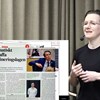wrongness
Age Discrimination: Is It Special? Is it Wrong?
In Bognar, G & A. Gosseries (red.) Ageing without Ageism? Conceptual Puzzles and Policy Proposals. Oxford Academic. Abstract This chapter examines the moral status of age discrimination by bringing t
Harm and Discrimination
Ethical Theory and Moral Practice, 22, 873–891. doi:10.1007/s10677-018-9908-4 Abstract Many legal, social, and medical theorists and practitioners, as well as lay people, seem to be concerned with the h
POSTPONED UNTIL OCTOBER 16: Katharina Berndt Rasmussen: Bridging Gaps - A Theory of Discrimination
Venue: Institutet för framtidsstudier, Holländargatan 13, 4th floor, Stockholm, or online. Research seminar with Katharina Berndt Rasmussen, PhD. in Philosophy.AbstractDisputes about discrimination surf
Katharina Berndt Rasmussen: Bridging Gaps - A Theory of Discrimination
Venue: Institutet för framtidsstudier, Holländargatan 13, 4th floor, Stockholm, or online. Research seminar with Katharina Berndt Rasmussen, PhD. in Philosophy.Register here >Abstract Disputes about d

Katharina Berndt Rasmussen: Bridging Gaps - A Theory of Discrimination
Research seminar with Katharina Berndt Rasmussen, PhD. in Philosophy. Disputes about discrimination surface time and again in the public debate: Is there such a thing as ”reverse discrimination” or ”S
Lea Ypi: On dominated dominators
Professor in Political Theory in the Government Department, London School of Economics. ABSTRACT This paper explores the case of dominated dominators as a way of understanding structural domination. I s
Completed: Harm and discrimination
What is it that makes discrimination wrong? We examine the concept of harm and its philosophical relevance, as well as the role it plays in discrimination.
Discrimination and Future Generations
In: Mosquera, J. & O. Torpman (ed.),Studies on Climate Ethics and Future Generations vol. 6. Working Paper Series 2024:10–17 Abstract In this paper, I analyse whether the present generation’s choices. This has been tentatively suggested in both legal theory and philosophy; I review such suggestions briefly in section 1. However, a more rigorous analysis – outlining the concept, relevant grounds, and wrong-making features of discrimination, and applying these to future generations – is still lacking. To address this lacuna, I propose a theory of discrimination and analyse why it might seem to apply – yet ultimately fails to apply – to the differential treatment of future generations. More specifically, I propose a definition of discrimination (section 2.1) and an account of the moral wrongness of discrimination (section 2.2). I moreover explore the connection between discrimination and theories of social (in)justice (section 2.3). I then apply this theory to the problem of differential treatment of future generations. While discrimination may occur between collectives, such as generations (section 3.1), my analysis shows that the specific temporal status of future generations is not comparable to other grounds of discrimination, such as gender or race (section 3.2). Moreover, due the non-identity problem and the problem of lack of a “community of social meaning” between generations, future generations cannot be claimed to be subjected to worse treatment by the present generation (section 3.3). Hence, their differential treatment due to the present generation’s choices does not amount to discrimination. Section 4 concludes and outlines some upshots of my analysis.
Researcher wanted for a study of Swedish voters
The Institute for Futures Studies is searching for a researcher for a research project on psychological and sociological differences between voters, depending on what party they would prefer to give t








